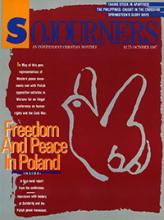The Iran-contra hearings have provided a summer-long opportunity for Reagan administration spokespersons to make their case for the contras on national television. During the hundreds of hours of testimony and speeches, I heard only one person make reference to the significant and constant opposition of U.S. church people to the contra war.
In his testimony before the joint congressional committee investigating the Iran-contra arms scandal, Assistant Secretary of State Elliott Abrams declared that he simply could not understand why churches and church groups in the United States would oppose aid to the contras. I would like to help Mr. Abrams and the administration he represents to understand.
U.S. churches and church-based groups have sent more people to Nicaragua and sent them for longer periods of time than have the State Department, the U.S. Congress, and very likely the entire U.S. government. What we have seen and heard convinces us that U.S. policy toward Nicaragua is wrong and horribly destructive.
The Reagan administration policy to overthrow the government of Nicaragua is not just mistaken, but is, in our view, morally corrupt and politically indefensible.That is our firm conviction. Church groups challenge almost every assertion made about Nicaragua by this administration. What the administration says are facts that support its policy we say are lies that are used to justify unspeakable violence.
Truth-telling is central to our biblical tradition, and this war has been built on a scaffold of deception. We have seen the work of Ronald Reagan's "freedom fighters" and know them to be terrorists instead. His "Nicaraguan Democratic Resistance" is in reality a U.S.-created and -sponsored mercenary army carrying out a proxy war for the Reagan administration.
Read the Full Article

